Review of Astro Boy: Greatest Astro Adventures
Introduction
`Astro Boy` has been knocking about since the late-1950`s in animated form, though doesn`t look a day over eight years old. But then maybe Robots hold up a little better than we do.
Despite this edition showcasing some of the best episodes from the early 80`s incarnation of this classic anime, much of the period feel of the piece remains intact - including rounded rocket spaceships, bulbous nosed authority figures and Astro`s trademark fifties quiff.
Something about the stories and the atmosphere of the series reminds me of `Tintin` though I`m struggling to put my finger on why, other than the two heralding from a similar age.
Osamu Tezuka started the grand tradition of moving manga to screen when he penned comics for children that included Jungle Emperor and Astro Boy, first published in 1952. He also penned thousands of other comics for children and adults as well as creating films, TV series and books.
The original 1960`s TV series of Astro Boy (known as `Mighty Atom` in Japan) ran for almost 200 episodes, and continues to air around the world to this day. Two decades after its original inception, Tezuka decided he wanted top revive the series and start again, taking the tales along a more serious, spiritual or moralistic line than the originals, in the way that he had originally intended - and all in colour for the first time.
Mari Shimizu, the original Japanese voice of Astro was brought back, along with Hisashi Katsuda playing Dr. Elfun. This collection gathers together an indicative 7 of the original 52 episodes.
`Astro Boy` is set in 2030 where shiny spaceships and robot children are nothing out the ordinary. Dr. Tenma from the Ministry of Science decides to revive his own dead son in the form of a robot. (ala Frankenstein). The robot doesn`t quite pan out as hoped and the little fella joins a circus (ala Pinocchio), before bring adopted by Dr. Elfun. He`s sent to a school run by the pompous but supportive daddy Mustache and there meets prejudice against robots in many forms. However, with his super rocket powers, Astro is soon able to fight for justice wherever he finds injustice - which happens in just about every episode here surprisingly.
For those interested in super-powers, young Astro`s are considerable. Don`t let the innocent cherubic face fool you.
- Super-strength up to 100,000 horsepower
- Jets in his legs enabling him to fly
- 1000x magnification of his hearing
- Laser guns that seems to sprout from his butt
- An electro-heart to read people`s true intentions and feelings
- Bright eye lamps to assist with his vision
It all looks surprisingly well animated, with as much movement detail as much in the current crop of anime, very much at odds with the typically static anime of the early eighties. This clearly reflects the generous budget allocated for the series. But this is about all the series has in common with current anime. This is sugar-candy coated stuff. With Astro Boy using his various robot powers to administer retribution, there`s never anything but a cute baby-face expression to let you know how he`s feeling. His cheeks may redden slightly but only when he`s almost psychotically angry.
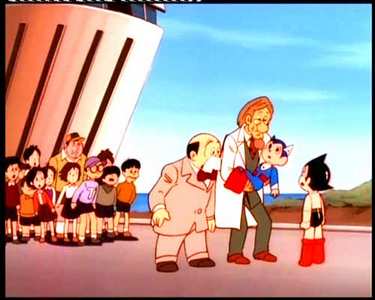
Video
Generally very good though the first episode in particular suffers from a pale pink transparent vertical strip moving from right to left throughout. I thought this may be interference from somewhere on my system, though when tested elsewhere discovered that it`s on the disc itself. (It stops when you pause). This may be as a result of the Japanese NTSC to PAL conversion. Whatever the case, it`s a sloppy start. The bulk of the episodes here look just fine though in their original 4:3 television format.
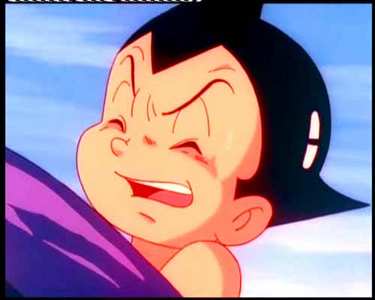
Audio
It all sounds a bit dated with too much top and a synthy soundtrack that could only have heralded from the early eighties. But then this is a period piece...
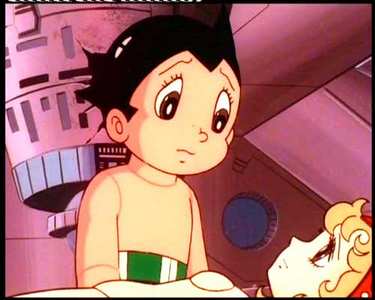
Features
None on this review disc though with a running time approaching three hours this is not intended to be a gripe.
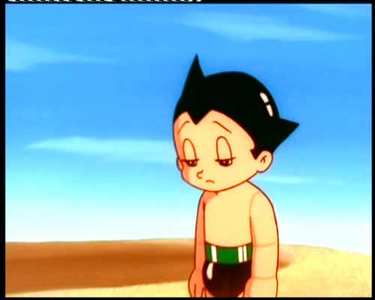
Conclusion
This release, featuring the first `Astro Boy` episodes ever made in colour, will appeal to those thirsting for a bit of early eighties retro, with its camp synthy title music and its block-lettered titles. Only the whole thing feels like early sixties retro at the same time. Which may not be that surprising as originator Osamu Tezuka was responsible for the original 1950`s manga, the 1960`s series and then this, an opportunity to realise the vision as he had originally intended, or so the possibly apocryphal tale goes.
It`s a lot of fun with its fiercely moralistic line and its clear anti-racist theming matched with knock `em up action and zany cartoonish humour.
This set, despite a decidedly dodgy transfer of its first episode, will provide the ideal taster for those considering buying the whole 52-episode box set. It may all seem a little dated now set against the current sophistication of anime, but it also has an atmosphere of good old fashioned good versus evil fun and should be of especial interest to those interested in the historic roots of Japanese manga and anime.
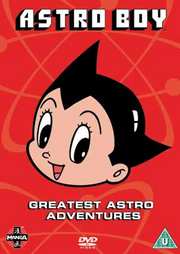




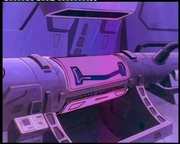
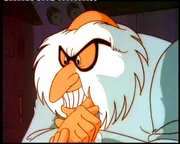
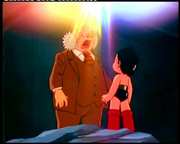
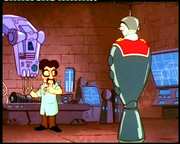
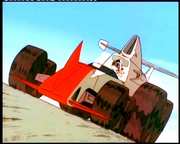
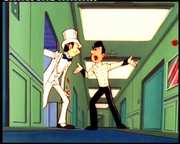
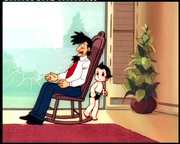
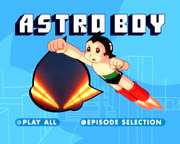































Your Opinions and Comments
Be the first to post a comment!